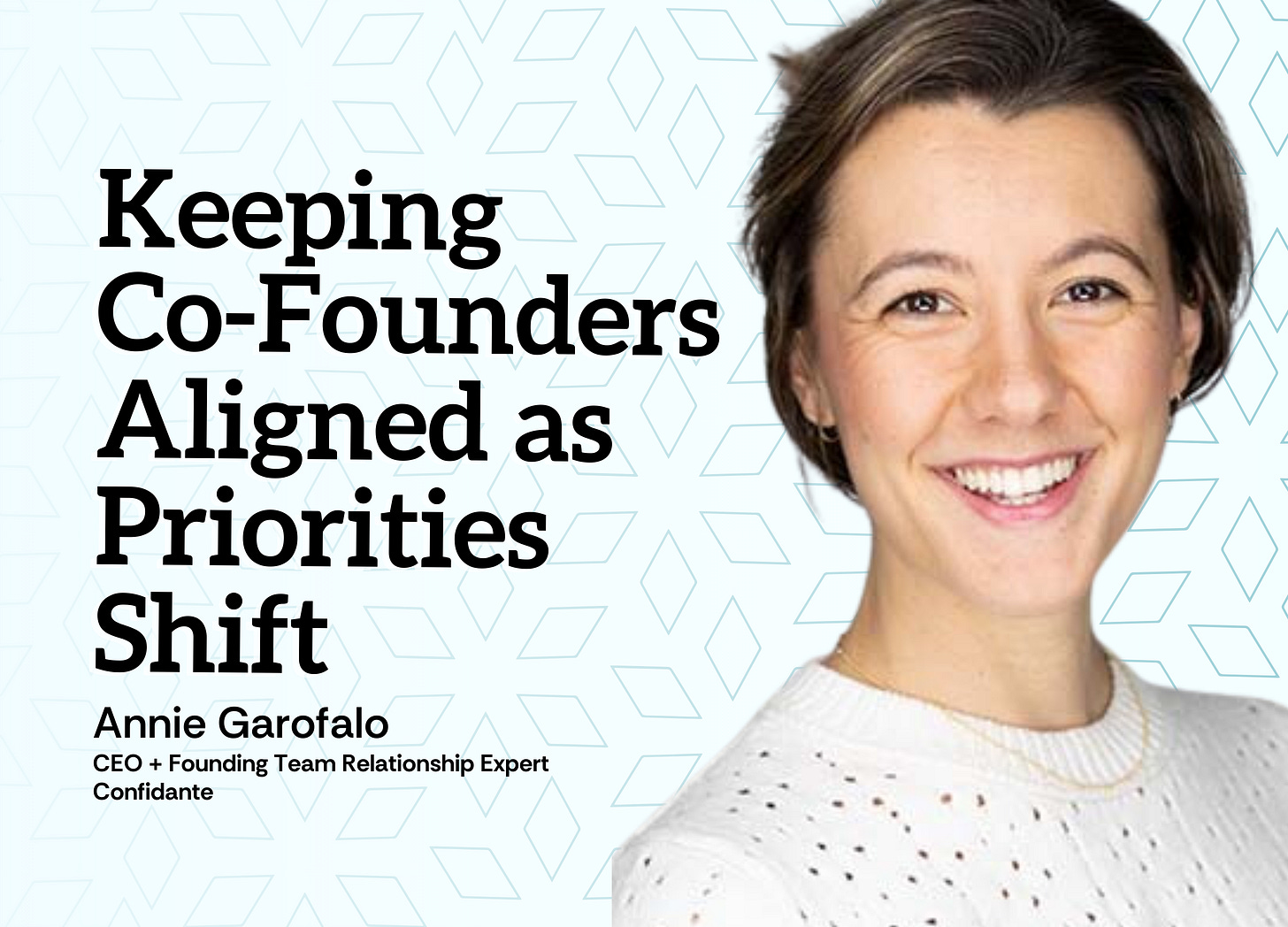Aligning Founders’ Work Styles for Startup Success
Tips for managing founder differences in work styles and priorities.
DEAR STAGE 2: My co-founder and I have very different work styles and personal priorities, and it's starting to cause friction in our working relationship. We want to address these differences proactively so that we stay aligned and productive. How can we approach this? ~STYLES IN SYNC
DEAR STYLES IN SYNC: Founders often bring different strengths and perspectives to the table, which can drive a startup’s success. But differences in work styles and personal priorities can sometimes throw friction into the mix. To help align and harmonize your working dynamic, I sat down with Annie Garofalo, founder of Confidante. Annie’s work applies proven methodology from premarital counseling to early stage founding teams in her 3-month “Partnership Agreement Program” focused on driving clarity and shared understanding between co-founders to prevent the conflict that kills 65% of startups.
In the words of Annie, “A team’s biggest challenges can often be anticipated by normalizing proactive conversations around personal priorities, work preferences, and team values.” Here’s a blueprint, using some of Annie’s recommended practices, for bridging the gaps in work style and personal priorities.
1. Define Your Roles – And Revisit Regularly
Establish Clarity Early: Take the time to define your roles in detail from the start, rather than letting responsibilities evolve on their own. This gives each founder a framework for where they’re accountable.
Schedule Role Check-Ins: Every six months or so, revisit these definitions. Particularly in high-growth periods, roles will change rapidly, and you’ll likely need to adjust responsibilities to fit both your evolving strengths and the company’s needs.
Document Your Responsibilities: Formalizing responsibilities can prevent overlaps or gaps. As Annie notes, “Founders don’t always need titles, but clarity on each person’s role helps ensure responsibilities are clear and prevents the resentment that can build when one founder feels they’re carrying more than their share.”
2. Map Out Work Style Preferences Together
Align on Decision-Making: Founders approach decisions differently—whether it’s by gut, consensus, or data-driven analysis. Defining which decisions will be made jointly versus independently helps avoid over-delegation and increases efficiency.
Formalize Your Communication Styles: Some founders prefer real-time communication, while others work best with more structured check-ins. As you define communication norms, create an agreement on both methods and frequency. Setting a cadence for your work syncs—whether daily, weekly, or biweekly—ensures that you’re on the same page.
Create a “Working Styles” Map: Use a tool like the “How Well Do You Know Your Co-Founder” exercise to chart out your own work preferences and perception of your co-founder’s. This opens up honest conversations around key differences and helps the team stay aware of potential misalignments that might disrupt productivity.
3. Adapt to Evolving Personal Priorities
Host Regular Personal Check-Ins: Given the all-consuming nature of a startup, life events and priorities shift. Schedule regular conversations focused on personal goals and energy levels—especially if one of you is balancing work with family or other outside commitments.
Adjust Workloads Proactively: Be transparent about what’s happening in each of your personal lives. If one founder’s bandwidth changes due to family needs, health, or even burnout, it’s better to adjust the load early rather than let it simmer until one person feels overburdened.
Prepare for Resilience: Especially during challenging seasons, know that sometimes neither founder will be at 100%. If you’re both operating below your usual capacity, consider temporary support for your most critical tasks.
4. Set Up Structured, Ongoing Feedback
Create a Feedback Loop: Set up biweekly or monthly check-ins dedicated to discussing your working relationship, where you can surface concerns in a structured, non-confrontational way. Annie suggests using a standing agenda to encourage openness: express appreciation, share constructive feedback, voice concerns or fears, and highlight where you could benefit from each other’s support. Annie suggests using these 4 questions to get started:
Stay Curious, Not Critical: As Annie shared, approach feedback conversations with a “curiosity, not criticism” mindset. For example, if a deadline isn’t met, open the discussion by asking if other priorities came up rather than assuming disinterest or disorganization. This approach helps prevent misunderstandings and allows you both to address issues constructively.
Commit to Small Behavioral Shifts: Regular feedback should translate into action. At the end of each feedback session, each founder should commit to one small change. It could be as simple as increasing meeting prep time, improving communication around priorities, or scheduling regular updates.
Founders set the tone for their entire company, so prioritizing these partnership practices and proactively discussing your work style differences and personal priorities will set a solid foundation as your team grows.
Until next week!




